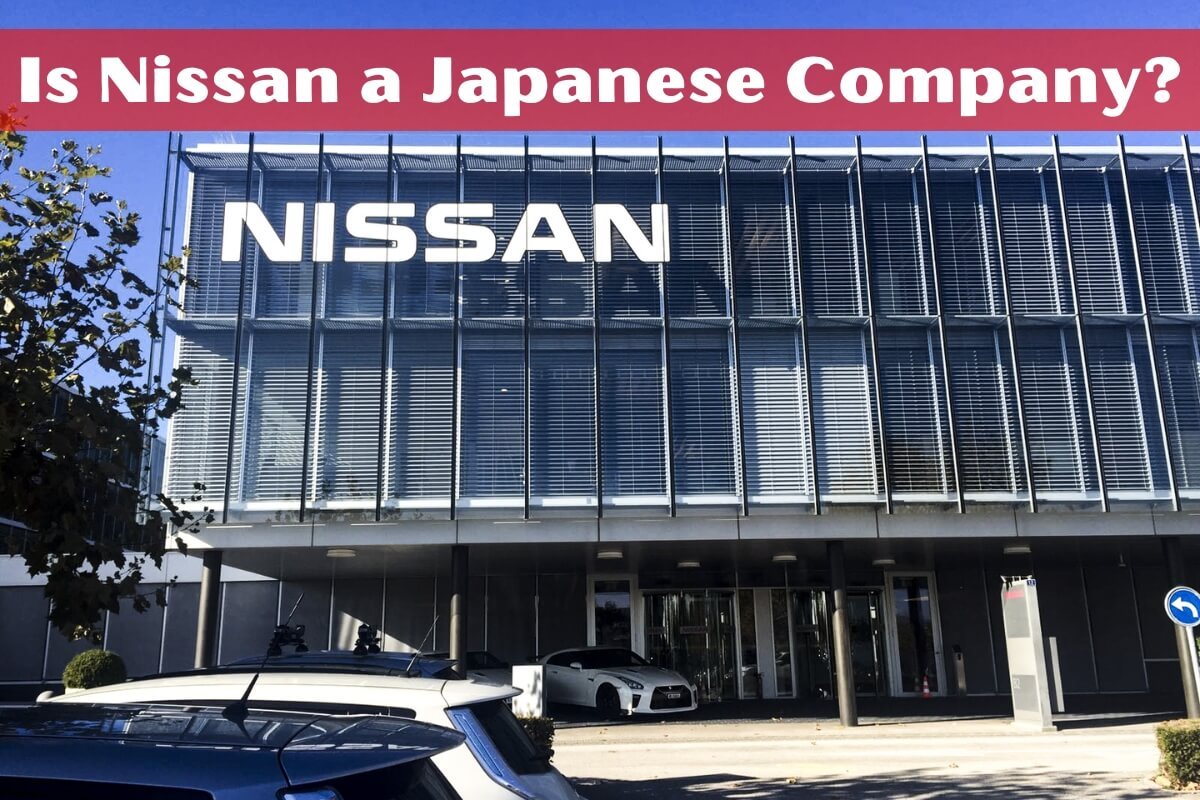Is Nissan a Japanese Company? The Comprehensive Guide

In the ever-evolving landscape of the automotive industry, one name stands out as a symbol of innovation, quality, and global appeal – Nissan. With its sleek designs and cutting-edge technologies, Nissan has captured the hearts and minds of car enthusiasts worldwide. However, many people wonder about the company’s roots and whether it truly hails from the Land of the Rising Sun. Is Nissan a Japanese company? The short answer is yes, Nissan is a Japanese multinational corporation with its origins deeply rooted in Japan.
Nissan’s story began with a humble dream in Japan. From its early days to its current global success, the company has remained true to its innovative spirit and commitment to progress. Let’s explore Nissan’s history, from its founding to its worldwide impact, and see how this pioneering brand has become a household name.
The Birth of Nissan: Tracing its Japanese Origins
Nissan’s story began in the early 20th century, when visionary entrepreneurs like Masujiro Hashimoto and Yoshisuke Aikawa laid the foundations for Japan’s budding automobile industry. In 1911, Hashimoto established the Kwaishinsha Motor Car Works, a small workshop in Tokyo that would later produce the DAT, one of Japan’s first domestically-built passenger cars.
A few years later, in 1925, the Kwaishinsha Motor Car Works merged with Jitsuyo Jidosha Co., another pioneering Japanese automaker, to form Dat Jidosha Seizo Co. This merger marked a pivotal moment in Nissan’s history, as it paved the way for the company’s eventual rise to prominence.
In 1933, the company underwent a significant transformation when new investors acquired its assets and established the Jidosha Seizo Co., Ltd. The following year, this newly formed entity adopted the name “Nissan,” derived from the abbreviation of the Japanese words “Ni” (sun) and “Ssan” (product or birth), symbolizing the company’s Japanese heritage and its commitment to innovation.
During its early years, Nissan achieved several milestones that solidified its position as a pioneering force in the Japanese automotive industry. In 1935, the company produced the Datsun Type 15, Japan’s first mass-produced vehicle, and in 1957, it introduced the iconic Nissan Skyline, a forerunner to the legendary GT-R sports car.
Nissan’s Global Expansion: From Japan to the World
While Nissan’s roots were firmly planted in Japan, the company quickly recognized the potential of the global market. In the 1950s, Nissan set its sights on the United States, introducing the Datsun 1000 to American consumers in 1958.
As the demand for fuel-efficient and affordable vehicles surged in the wake of the 1973 oil crisis, Nissan was well-positioned to capitalize on this opportunity. The company expanded its manufacturing operations, establishing facilities in Mexico, Australia, Taiwan, and the United States, enabling it to meet the growing demand for its vehicles worldwide.
Nissan’s strategic partnerships and alliances also played a pivotal role in its global expansion. In 1999, the company formed the Renault-Nissan Alliance with the French automaker Renault, creating a powerful force in the automotive industry. This alliance was further strengthened in 2016 when Mitsubishi Motors joined, forming the Renault-Nissan-Mitsubishi Alliance.
Nissan’s Manufacturing Footprint: Where Are Nissan Vehicles Made?
Nissan’s commitment to meeting the diverse needs of consumers around the world is reflected in its global manufacturing footprint. With production facilities spanning multiple continents, Nissan has established a robust and localized manufacturing presence.
In Japan, Nissan’s headquarters and several key production facilities are located in Yokohama, Kanagawa Prefecture. This is where the company’s roots were first established, and it continues to be a hub for innovation and cutting-edge technology development.
Recognizing the importance of the North American market, Nissan has invested heavily in manufacturing facilities in the United States. The company’s Smyrna plant in Tennessee is one of the largest vehicle assembly plants in North America, producing popular models like the Altima, Maxima, LEAF, Rogue, Pathfinder, and INFINITI QX60. Additionally, Nissan has production facilities in Decherd, Tennessee, and Canton, Mississippi, further solidifying its presence in the region.
Nissan’s global reach extends far beyond Japan and North America. The company has established manufacturing operations in Mexico, where it produces vehicles for both domestic and export markets. China, another crucial market, is home to several Nissan production facilities, including a state-of-the-art plant in Guangzhou, which is one of the company’s largest factories worldwide.
By maintaining a diverse and strategically located manufacturing footprint, Nissan can effectively cater to the unique preferences and demands of consumers across various regions, ensuring that its vehicles are tailored to meet local requirements and regulations.
Nissan’s Innovative Spirit: Driving Technological Advancements
One of the hallmarks of Nissan’s success is its unwavering commitment to innovation and technological advancement. As a company rooted in Japanese engineering excellence, Nissan has consistently pushed the boundaries of what is possible in the automotive industry.
Nissan’s dedication to sustainable mobility is exemplified by its leadership in the electric vehicle (EV) market. The Nissan LEAF, introduced in 2010, was a game-changer in the EV segment, becoming the world’s first mass-produced and affordable all-electric car. As of April 2018, Nissan held the title of the world’s largest EV manufacturer, with global sales of over 320,000 all-electric vehicles.
In addition to its groundbreaking work in EVs, Nissan has pioneered other innovative technologies that have revolutionized the driving experience. The company’s e-POWER system, for instance, combines a gasoline engine with an electric motor, providing the smooth and responsive acceleration of an EV while offering the extended range of a traditional internal combustion engine.
Nissan’s commitment to innovation extends beyond its vehicles. The company has invested heavily in research and development, collaborating with universities and research institutions to explore cutting-edge technologies and solutions. From advanced driver-assistance systems like ProPILOT Assist to autonomous driving technologies, Nissan is at the forefront of shaping the future of mobility.
Nissan’s Product Portfolio: From Compact Cars to Powerful SUVs
Nissan’s diverse product portfolio is a testament to its ability to cater to a wide range of consumer preferences and needs. From sleek and efficient sedans to rugged and capable SUVs, Nissan offers a vehicle for every lifestyle and taste.
The Nissan Altima, a midsize sedan renowned for its stylish design and impressive fuel efficiency, has been a staple in the company’s lineup for decades. The Rogue, a compact SUV with a spacious interior and versatile cargo space, has become a popular choice for families and adventure seekers alike.
For those seeking a more premium driving experience, Nissan’s INFINITI brand offers a range of luxury vehicles that combine sophisticated styling with cutting-edge technology and performance. The INFINITI QX60, for instance, is a luxurious three-row SUV that provides ample space and comfort for families, without compromising on style or amenities.
Nissan’s lineup also includes iconic sports cars like the Nissan Z and the legendary GT-R, catering to the needs of performance enthusiasts and adrenaline junkies. Meanwhile, the Frontier and Titan pickups offer rugged capabilities and versatility for those with demanding work or recreational needs.
By offering such a diverse range of vehicles, Nissan demonstrates its commitment to meeting the diverse needs and preferences of consumers worldwide, solidifying its position as a truly global automaker.
Nissan’s Cultural Influence: Blending Japanese Heritage with Global Appeal
While Nissan’s vehicles are appreciated globally for their quality, innovation, and performance, the company’s cultural influence extends beyond its products. Nissan has masterfully blended its Japanese heritage with a global appeal, creating a brand that resonates with consumers around the world.
Japanese design principles and aesthetics have played a significant role in shaping Nissan’s vehicles. From the sleek and minimalist lines of the Altima to the bold and dynamic styling of the GT-R, Nissan’s designs embody a harmonious fusion of form and function, reflecting the Japanese philosophy of simplicity and elegance.
Moreover, Nissan’s marketing and advertising campaigns have celebrated diversity and innovation, showcasing the brand’s global reach and its ability to connect with consumers from different cultural backgrounds. Through captivating storytelling and visually stunning campaigns, Nissan has positioned itself as a brand that transcends borders and embraces the richness of diverse cultures.
One prime example of Nissan’s cultural influence is its longstanding partnership with the iconic Star Wars franchise. The brand has collaborated with Lucasfilm to create special edition vehicles and marketing campaigns that seamlessly blend the worlds of automotive engineering and science fiction fantasy. This partnership has not only captured the imaginations of fans worldwide but has also showcased Nissan’s ability to tap into global cultural phenomena and forge meaningful connections with consumers.
Frequently Asked Questions about Nissan’s Origins and Global Presence
To further demystify the origins and global reach of Nissan, let’s address some frequently asked questions:
Is Nissan a Japanese or American company?
Nissan is a Japanese multinational corporation with its headquarters located in Yokohama, Japan. While the company has a significant presence in the United States and other global markets, its roots and corporate identity are firmly rooted in Japan.
When was Nissan founded?
Nissan’s origins can be traced back to the early 20th century, with the establishment of the Kwaishinsha Motor Car Works in 1911 and the subsequent mergers and transformations that led to the formation of the Jidosha Seizo Co., Ltd. in 1933, which later became Nissan Motor Co., Ltd. in 1934.
Where are Nissan vehicles manufactured?
Nissan has a global manufacturing footprint, with production facilities located in various countries, including Japan, the United States, Mexico, China, and others. The company’s manufacturing strategy emphasizes localized production to cater to regional demands and preferences effectively.
Is Nissan owned by Toyota or another Japanese automaker?
No, Nissan is an independent company and is not owned by Toyota or any other Japanese automaker. However, Nissan is part of the Renault-Nissan-Mitsubishi Alliance, a strategic partnership with the French automaker Renault and Japanese automaker Mitsubishi Motors.
How does Nissan compare to other Japanese automakers in terms of reliability and quality?
Nissan has consistently ranked among the top Japanese automakers in terms of reliability and quality. While Toyota and Honda often lead the pack, Nissan vehicles are known for their durability, dependability, and value for money, making them a popular choice among consumers worldwide.
Ending Thoughts
Nissan’s journey from its humble beginnings in Japan to its current status as a global automotive powerhouse is a testament to the company’s resilience, innovation, and unwavering commitment to quality. While its roots are firmly planted in the Land of the Rising Sun, Nissan’s reach has extended far beyond its home country, embracing a global vision and adapting to the diverse needs of consumers worldwide.
From its pioneering efforts in electric vehicles and cutting-edge technologies to its diverse product portfolio and cultural influence, Nissan stands as a shining example of how a Japanese company can seamlessly blend its heritage with global appeal. Whether you’re a performance enthusiast seeking the thrill of the GT-R, a family seeking the versatility of the Rogue, or an environmentally conscious consumer looking for an electric vehicle like the LEAF, Nissan has something to offer for every taste and lifestyle.
As the automotive industry continues to evolve and new challenges emerge, Nissan remains poised to lead the charge, driven by its innovative spirit and unwavering commitment to excellence. With its roots firmly grounded in Japan and its sights set on the future, Nissan is a company that embodies the perfect fusion of tradition and modernity, setting the stage for a new era of mobility that transcends borders and inspires generations to come.






